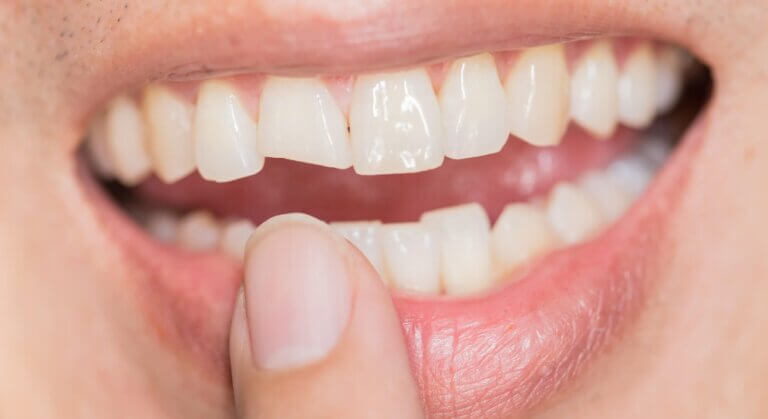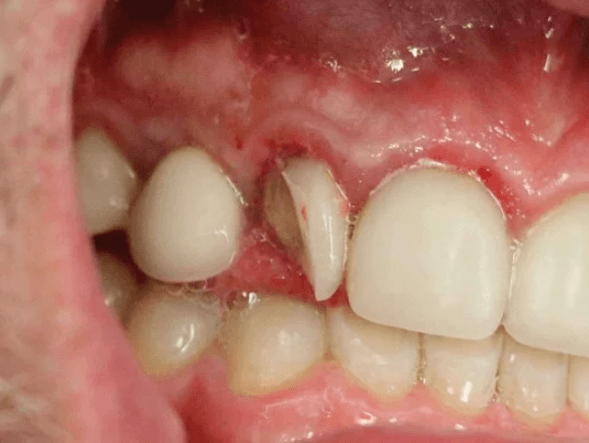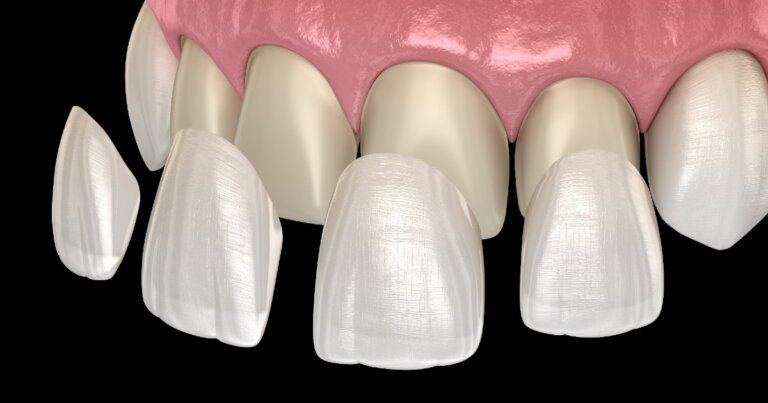Chipped Dental Veneer

What Is A Chipped Dental Veneer?
A chipped dental veneer occurs when part of the thin layer of porcelain or composite material bonded to your teeth breaks, exposing the tooth underneath or leaving an uneven surface. Veneers are used to improve the appearance of teeth, enhancing both color and shape. They are typically made of porcelain, ceramic, or zirconia and can last many years with proper care. However, accidents or normal wear and tear can cause veneers to chip, leading to discomfort and cosmetic concerns.
If you suspect you’ve chipped your dental veneer, here’s what you need to know before visiting your Toronto dentist:
- Why Do Dental Veneers Chip?
- Signs And Symptoms Of A Chipped Dental Veneer
- Treatment Options For A Chipped Dental Veneer
- Managing A Chipped Dental Veneer Until You Can See The Dentist
- Frequently Asked Questions About Chipped Dental Veneers
If you have questions about a Chipped Dental Veneer or other dental problems, please contact us for more information.
Why Do Dental Veneers Chip?
Several factors can cause a dental veneer to chip, including:
- Biting on hard objects: Chewing ice, hard candy, or even non-food items like pens can damage veneers.
- Teeth grinding (Bruxism): Excessive grinding or clenching, especially during sleep, puts pressure on veneers and can cause them to chip or crack.
- Trauma: Falls, sports injuries, or accidents can lead to chipped veneers.
- Natural wear: Over time, veneers may weaken and become more vulnerable to chips.
- Improper fitting: Poorly fitted veneers may not withstand normal biting and chewing forces, making them more prone to damage.
Identifying why your veneer chipped is important for preventing future issues. If you have further questions about a Chipped Dental Veneer, please contact us.

Signs And Symptoms Of A Chipped Dental Veneer
Here are common signs of a chipped dental veneer:
- Tooth Sensitivity: You may feel discomfort or pain when chewing or biting.
- Visible damage: A noticeable chip or crack in the veneer.
- Rough texture: The chipped veneer may feel jagged or rough when you run your tongue over it.
- Loose veneer: In some cases, a chipped veneer may become loose or fall off entirely.
- Gum irritation: The sharp edges of the chip may irritate the surrounding gums.
If you notice any of these symptoms, visit your dentist promptly. Delaying treatment could lead to further damage or infection. If you have further questions about signs and symptoms related to a Chipped Dental Veneer, please contact us.
Treatment Options For A Chipped Dental Veneer
Depending on the severity of the damage, your dentist may recommend one of the following treatments:
- Dental Bonding: For small chips, your dentist can apply a tooth-colored composite resin to restore the veneer’s appearance.
- Smoothing the Edges: If the chip is minor and not noticeable, your dentist may smooth out the rough edges.
- Veneer Replacement: For more significant damage, replacing the veneer may be necessary.
Prompt treatment is essential to avoid more extensive issues, such as infection or tooth damage. If you have further questions about treatment options for a Chipped Dental Veneer, please contact us.

Managing A Chipped Dental Veneer Until You Can See The Dentist
If you can’t see your dentist immediately, here’s how to manage a chipped veneer:
- Keep the chipped piece: Place it in a safe container to bring to your dental appointment.
- Maintain good oral hygiene: Brush and floss gently around the chipped area. Rinse your mouth with warm salt water or an antiseptic mouthwash to reduce irritation and prevent infection.
- Avoid hard or sticky foods: Stick to soft foods and chew on the unaffected side of your mouth.
- Use over-the-counter pain relief: If you’re in discomfort, you can take painkillers like acetaminophen (Tylenol) or ibuprofen (Advil). Always follow recommended dosages or consult your dentist for guidance.
These are temporary measures—seek professional dental care as soon as possible to prevent further complications. If you have further questions about managing a Chipped Dental Veneer, please contact us.
Frequently Asked Questions About Chipped Dental Veneers
- Can a chipped dental veneer be repaired, or does it need replacement?
Minor chips can sometimes be repaired with composite resin. Extensive damage, however, may require replacement for proper function and aesthetics.
- How long does a dental veneer typically last?
With good care, a dental veneer can last 5 to 15 years, though habits like teeth grinding or poor oral hygiene can shorten its lifespan.
- How can I prevent my dental veneer from chipping?
Avoid hard foods, use a night guard if you grind your teeth, and maintain regular dental check-ups and good oral hygiene.
- Can an untreated chipped veneer cause other problems?
Yes, it may lead to tooth sensitivity, gum irritation, or damage to the supporting teeth. Timely dental care is essential to avoid complications.
Addressing a chipped dental veneer promptly can prevent further complications and ensure your oral health stays on track. If you have further questions about managing a Chipped Dental Veneer, please contact us.

